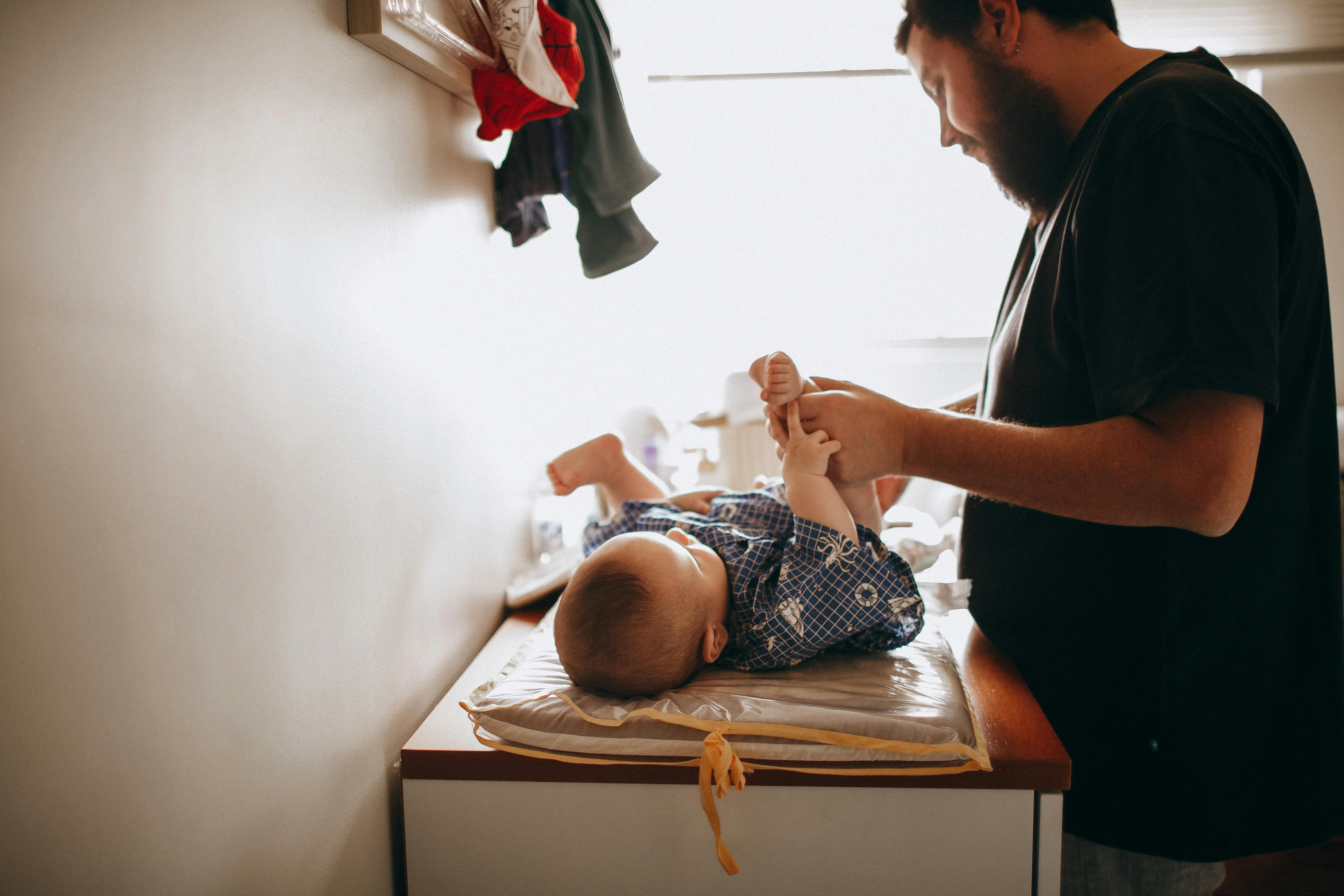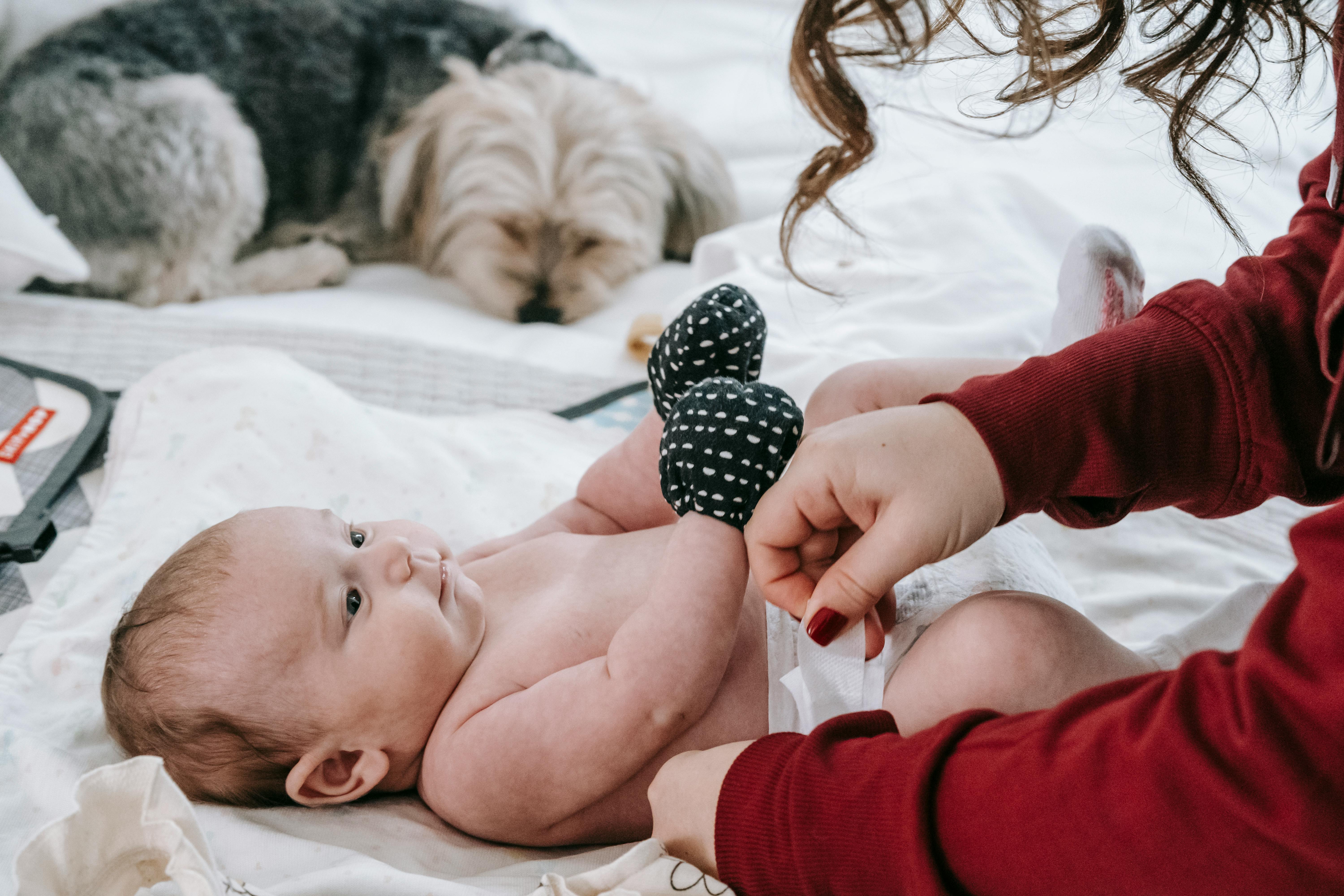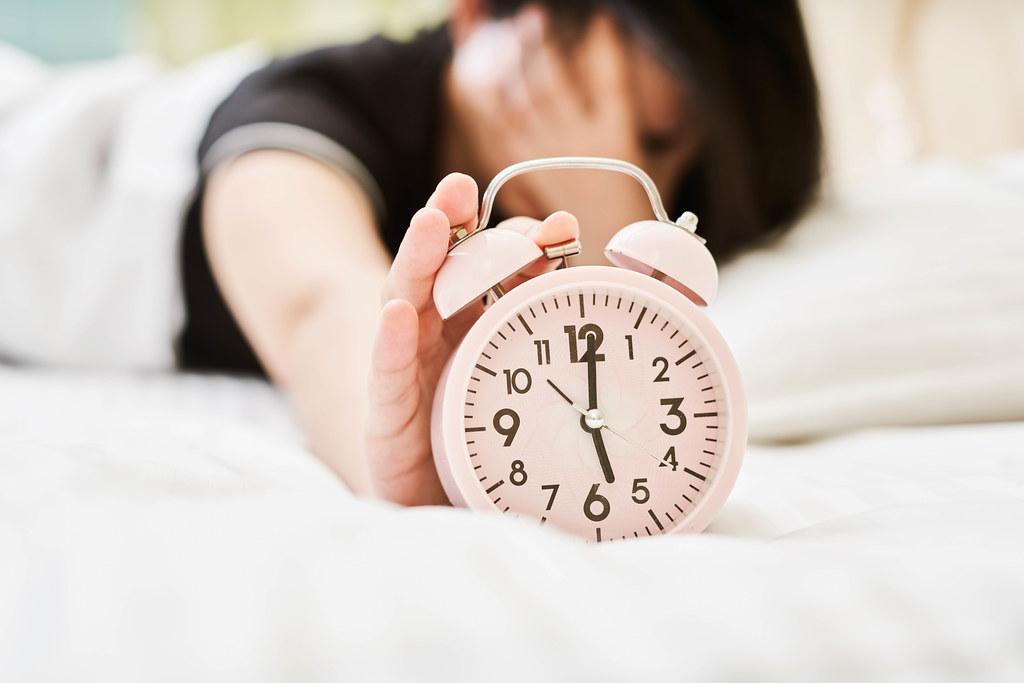Changing a baby’s diaper can be a daunting task, especially if they are sleeping. Many parents wonder if they should wake their baby up in order to change their diaper. This can be a difficult decision to make, as waking a sleeping baby can be disruptive for both the infant and the parent. In this article, we will discuss the pros and cons of waking a baby to change their diaper and provide tips on how to handle this situation.No, you should not wake a baby to change their diaper. It is best to wait until the baby is awake and alert before changing their diaper. Changing a diaper while a baby is sleeping can cause them to wake up and become upset, which can disrupt the sleep cycle.
Pros of Waking Baby to Change Diaper
Waking your baby up to change their diaper can have a few benefits. Firstly, it allows you to properly assess the need for a diaper change. When a baby is asleep, it can be difficult to tell if they need a change or not. By waking them up, you are able to ensure that the diaper is properly changed. Secondly, it can help prevent diaper rash. Diaper rashes are more likely to occur when the diaper is left on for too long. By changing the diaper as soon as you notice that it needs changed, you are helping prevent any uncomfortable skin irritation for your baby.
Cons of Waking Baby to Change Diaper
Although there are some pros to waking a baby up to change their diaper, there are also some drawbacks that should be considered. Firstly, waking a sleeping baby can be disruptive and may even cause them distress. If your baby is in the middle of a deep sleep cycle, then waking them up could cause them distress and may even make them harder to settle back down again afterwards. Secondly, babies thrive on routine and consistency. If you wake your baby up every time you need to change their diaper then this could disrupt their natural sleeping pattern and make it difficult for them to get into a regular routine.
What if Baby Wakes Up During Diaper Change?
Diaper changes can be a tricky business. One minute your baby is sound asleep, and the next they’re wide awake and seemingly ready to take on the world. If your baby wakes up during a diaper change, don’t worry! It’s completely normal and there are some easy steps you can take to help make the process smoother.
First, try not to startle your baby by talking in a calm voice and using gentle movements. This will help your little one adjust to being awake. Once they’re awake, it’s important to keep them engaged and distracted while you finish changing their diaper. Try talking to them, playing a game or singing a song – anything that will keep their attention off of the diaper change itself.
If your baby is still uncomfortable or unhappy during the diaper change, try giving them something to hold or look at like a toy or book. This will help keep them occupied while you finish up their diaper change. It’s also important to give your baby lots of praise throughout the process – let them know how brave and strong they are for getting through it!
Finally, if all else fails, it may be time for a break! Take your little one out of their changing area for some cuddles and comfort before trying again later. With patience and lots of love, you can help make diaper changes as stress-free as possible for both you and your baby.
The Importance of Proper Diaper Changing
Diaper changing is one of the most essential parenting tasks and it helps to keep the baby clean, dry, and healthy. It also helps to prevent skin irritation and infections. Proper diaper changing techniques are important to ensure the health and well-being of your baby.
Changing diapers can be tricky because it requires some skill and knowledge. It is important for parents to understand the basics of diaper changing so that they can do it properly. Proper diaper changing involves using clean materials, disposing of soiled diapers properly, and applying a fresh diaper quickly and safely.
Using clean materials is an important part of proper diaper changing. This includes washing your hands thoroughly before and after each diaper change, using a fresh diaper each time, and cleaning any surfaces that come into contact with the baby’s bottom with warm water or a disinfectant cleaner.
It is also important to dispose of soiled diapers properly in order to prevent germs from spreading. Dispose of soiled diapers in an airtight container or a designated diaper pail with a lid. Make sure that you wash your hands thoroughly after disposing of any soiled diapers as well.
Finally, applying a fresh diaper quickly and safely is important for proper diaper changing. Make sure that you use the right size of diaper for your baby’s age and weight, apply it correctly with the tabs lined up on either side, ensure it fits snuggly but not too tight around their legs, waist, and groin area, and check for signs of skin irritation or rash afterwards.
In summary, proper diaper changing is essential for keeping babies clean, dry, healthy,and safe from skin irritations or infections. Parents should understand the basics of proper diapering techniques in order to ensure their baby’s health and well-being are protected during this critical period in their development.
How to Minimize Disruption When Changing Baby’s Diaper
Changing a baby’s diaper can be a tricky task; it needs to be done quickly but also with care to minimize disruption for both the baby and the parent. Here are some tips on how to make diaper changing as stress-free as possible:
First, always keep supplies within reach. Have a diaper changing station in place, stocked with all necessary items such as diapers, wipes, rash creams, and so on. This will save time and energy when you need to quickly change your baby’s diaper.
Second, ensure your baby is comfortable during the process. If possible, try to eliminate distractions such as loud noises or bright lights that may cause your baby to become agitated or upset. Also be sure to talk to your baby in a soothing voice and use gentle movements when handling them during the diaper change.
Third, use distraction techniques while changing the diaper. Singing songs, playing games or reading books can help divert your baby’s attention away from the process itself. This can help reduce their anxiety levels and make them more cooperative during the process.
Finally, take advantage of technology when available. There are many apps and websites that offer distraction techniques such as music or stories that can help keep your baby calm while you change their diaper. Additionally, some apps allow you to set up reminders for when it is time for diaper changes so you don’t forget!
By following these tips and taking advantage of available resources, it is possible to minimize disruption when changing a baby’s diaper and make it a more pleasant experience for everyone involved.

When is the Best Time to Change Your Baby’s Diaper?
Changing your baby’s diaper regularly is a necessary part of caring for a newborn. Not only is it important for the health and hygiene of your baby, but it also helps keep them comfortable and free from diaper rash. Knowing when to change your baby’s diaper can be difficult, so here are some tips to help you determine when the best time is to change their diaper.
First and foremost, it’s important to look out for signs that your baby needs a diaper change. If your baby is fussing or seems uncomfortable, then it may be time for a new diaper. Additionally, if you notice wetness or soiling in their diaper, then it’s definitely time for a change.
In general, you should aim to change your baby’s diaper every two to three hours or whenever necessary. This frequency will help reduce irritation and discomfort as well as prevent infection or skin breakdown from prolonged exposure to moisture.
You should also try to establish a routine with your baby when it comes to changing their diapers. For example, you can try changing their diapers at regular intervals throughout the day such as right after they wake up in the morning and right before they go to bed at night. This will help ensure that they get fresh diapers consistently and on time.
Finally, always make sure you have all the necessary supplies on hand before attempting to change your baby’s diaper. Make sure you have plenty of diapers in various sizes as well as wipes, creams, and other products that might be useful during a diaper change. Having everything prepared ahead of time will make the process much smoother and easier for both you and your baby.
By keeping these tips in mind, you can ensure that your baby stays comfortable and clean by changing their diapers regularly and on time!
Potential Risks of Not Changing Diapers Regularly
Diapers are designed to absorb and contain urine and feces, but when they are not changed regularly, the diaper can become uncomfortable and may lead to health risks for your baby. Not changing diapers regularly can increase the baby’s risk of developing diaper rash, urinary tract infections, or other skin irritation. Diaper rash is caused by prolonged exposure to a wet diaper and can cause the skin to become red, irritated, and inflamed. Urinary tract infections occur when bacteria get into the bladder and can cause pain, fever, and vomiting. If left untreated, it can lead to more serious complications. Additionally, if the diaper is not changed frequently enough it may cause skin irritation from prolonged contact with urine or feces. This can lead to redness, itching, or discomfort in the area covered by the diaper.
It is important to change diapers as soon as they become soiled or wet in order to reduce your baby’s risk of any of these health issues. In addition to changing diapers frequently, it is important to use a mild soap and water when cleaning the area around your baby’s genitals during diaper changes. This will help keep bacteria from entering your baby’s body and causing infection or irritation. It is also important to make sure that you always use a clean diaper so that you don’t accidentally introduce bacteria into your baby’s system.
Is it OK to Leave a Wet or Soiled Diaper On Your Baby?
It is not recommended to leave a wet or soiled diaper on your baby for any period of time. The longer a diaper stays on your baby, the more likely it is to cause skin irritation and discomfort. Diapers are designed to absorb moisture quickly, but if left too long, the moisture can remain in contact with the skin, resulting in rashes and other skin problems. Additionally, prolonged contact with a soiled diaper can cause bacteria and yeast infections. It is important to change your baby’s diaper as soon as possible after it becomes wet or soiled.
If you find yourself unable to change your baby’s diaper right away, you can use a barrier cream such as zinc oxide or petroleum jelly to protect their skin from being exposed for too long. This can help keep their skin from becoming irritated and uncomfortable while you take care of the task at hand.
It is also important to make sure that you are using the right type of diaper for your baby’s age and size, as well as following instructions on how often they should be changed. Check your baby’s diapers every two hours or whenever they seem wet or soiled. Taking these steps will help ensure your baby’s comfort and prevent any potential health issues that may arise from leaving a wet or soiled diaper on for too long.

Conclusion
In conclusion, it is not necessary to wake baby to change diaper. It is best to wait until baby is naturally awake and alert before changing the diaper. This will help keep baby comfortable and minimize stress for the baby and parents. It can be helpful to have a consistent routine for changing diapers that fits your family’s lifestyle. However, if your baby has a rash or is very uncomfortable, it may be necessary to wake them to change their diaper. If so, make sure you keep them warm and comfortable while doing so.
Overall, it is best practice to let sleeping babies lie when it comes to changing diapers. This will help ensure they get enough rest while also keeping them safe and comfortable.




